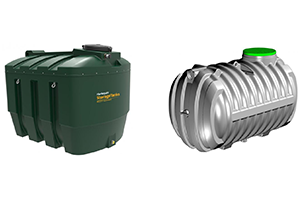A complete guide to using storage tanks on your rural property
If you live on a farm or in a remote location, then it’s likely that you will require storage tanks for your heating oil, fuel, and waste management needs. Being able to manage these facilities on site is often a necessity, although it can also bring about countless benefits including cost-savings and lower carbon emissions. Here is everything you need to know about using storage tanks on your rural property.
When are storage tanks needed?
As mentioned, it is often the case that rural properties like farms depend on storage tanks for their fuel and water treatment needs. For instance, many rural properties are unable to connect to the main plumbing system due to their remote location. This means that they must have waste management facilities to deal with waste safely on-site. There are two main types of waste management systems available - septic tanks and a sewage treatment plant. The most appropriate system will depend on various factors including the size of your property and the amount of waste you produce. Many rural properties are also required to store large volumes of fuel on-site. This may be required for fuel-intensive operations on working farms, or simply because a homeowner has infrequent fuel deliveries due to the remote location of their property. When fuel like heating oil is kept on your property, it must be stored in a way that is secure and compliant with health and safety regulations. 
What are the key benefits of storage tanks?
One of the key benefits of storage tanks is convenience. Fuel tanks allow rural properties to store large quantities of potentially hazardous liquid, including heating oil. This reduces the frequency of fuel deliveries. Having the facilities to store fuel on-site saves money and also means that rural businesses and homeowners can take advantage of deals and bulk order heating oil when prices are low. High-quality fuel tanks, such as bunded oil tanks, also ensure that your storage is compliant with environmental regulations due minimising the likelihood of leaks. An oil leak can be extremely costly and cause serious environmental damage, so it’s always worth investing in a quality fully-bunded storage tank. Bunded oil tanks also help to protect your fuel from vandalism and theft.
What maintenance is required?
The relevant building regulations must be complied with when you install a storage tank on your rural property. For instance, these rules state that domestic oil tanks must be installed at least 1.8 metres away from any building that is not fire-resistant. The simplest way to ensure that your storage tank is compliant is by having the tank installed by an OFTEC-certified professional. Once installed, you must also complete various maintenance tasks to ensure that your tank remains secure. This includes emptying septic tanks regularly to reduce the likelihood of leaks or spillages. Bunded oil tanks must be inspected regularly to check for signs of wear or damage. Any repairs to your storage tank must be carried out by a competent accredited person. If you have a storage tank installed on your property, then you must do your research and know what action you need to take to remain compliant. If you are unsure of your responsibilities, then you should contact the Environment Agency or local septic tank provider for advice and guidance.
Summary
There are dozens of benefits to using storage tanks on your rural property. If you live in a remote location, then chances are you will rely on tanks for your fuel or waste management needs. Make sure that you do your research and choose a high-quality storage tank that will need the needs of your property. You must also have your tank installed by a certified professional and follow the recommended maintenance.
Sources
Plastic Bunded Oil Tanks, Tanks for Everything, tanksforeverything.co.uk
Getting The Best Heating Oil Prices, Which?, which.co.uk
Fuel Storage Tanks, OFTEC, oftec.org
Oil Storage, GOV.UK, https://www.gov.uk/topic/environmental-management/oil-storage
- Log in to post comments

